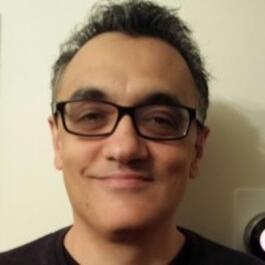
The Voice of Tomorrow: An Interview With Dr. Ahmed Bouzid - Part 1
“I would say that the core driver has always been trying to enable more folks to engage, more people to be able to express themselves. So when I go back and look at all the things in my life, that seems to be the theme." -- Dr. Ahmed Bouzid This episode's guest is the founder and CEO of Witlingo, a McLean, Virginia-based company that builds tools for publishing sonic experiences, from Alexa Skills, Google Actions, and Bixby Capsules to Microcasts and social audio products and solutions. Before Witlingo, he was the Head of Product at Amazon Alexa and the Vice President of Product at Genesys. He holds twelve patents in Human Language Technology, is an Ambassador at The Open Voice Network, an Editor at The Social Epistemology Review and Reply Collective (SERRC), and was recognized as a "Speech Luminary" by Speech Technology Magazine, as well as among the Top 11 Speech Technologists by Voicebot.ai. His name is Dr. Ahmed Bouzid, and if you have any interest in the future of voice and technology, this will be an enlightening discussion. As always, if you have any questions for my guest, you’re welcome to reach out through the links in the show notes. If you have questions for me, just visit audiobrandingpodcast.com where you’ll find all sorts of ways to get in touch. Plus, subscribing to the newsletter (on the audiobrandingpodcast.com webpage) will let you know when the new podcasts are available. Better Than Computers Dr. Bouzid starts the interview by recalling his formative years in Casablanca, and his memories of waking up to the sounds of chickens on his family’s villa. He goes on to tell us about his work as a software engineer and how computers still have a long way to go to catch up with human language skills. “Language is a very fascinating problem to solve from the technological perspective,” he explains, “one of the hardest problems in artificial intelligence.” Teaching a Machine Manners We take a deeper look at the paradox of machine learning versus the human brain, how people have evolved around the use of language in a way that computers haven't. "Some people say that we are wired for language," he tells us, "that it's something that we are born with." Even something as seemingly simple as being polite can be almost impossible to program into a computer since it depends on so many cultural and social cues that we don't usually think about. The Fish and the Bird Next, we talk about Witlingo and the challenges facing voice-first systems like Alexa and Siri. Dr. Bouzid explores one of those challenges with a story he calls the Fallacy of the Fish and the Bird that illustrates the temptation to judge a new product using the same metrics that we used for the older ones, even when they don’t make sense. As he put it, “the metrics of the fish don't apply to the bird, and, also, there are a lot more fish than there are birds.” Thinking Like a Bot The first half of our interview focuses on the advantages and limitations of chatbots, the uncanny valley that an almost-human voice system can fall into, and his approach to making AI voices and voice-first interfaces more accessible. “I subscribe to the school of thought that says we should not try to have the bot emulate the human being,” Dr. Bouzid explains. “The conversation between a human being and a bot is different than a human being to a human being.” Episode SummaryDr. Bouzid’s early childhood in MoroccoWhy humans are better at speech than computersThe challenges of teaching an AI languageWitlingo and the metrics of voice-first softwareHow we talk to and interact with voice AI Connect with...
From "Audio Branding"




Comments
Add comment Feedback